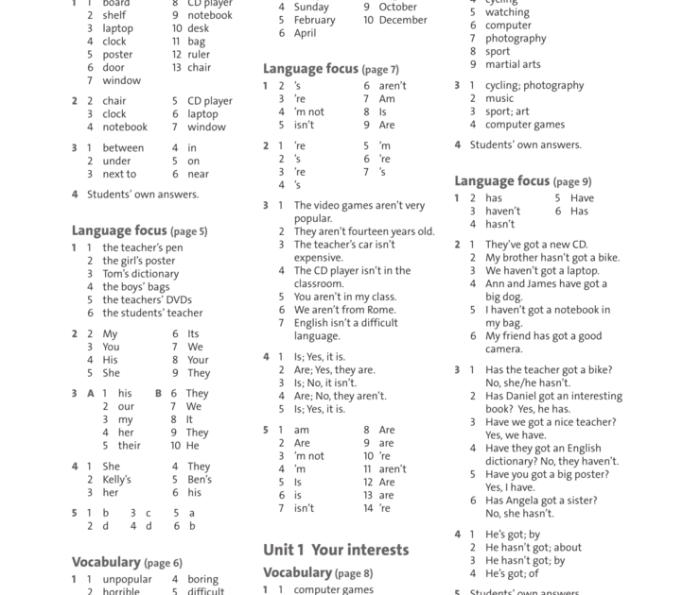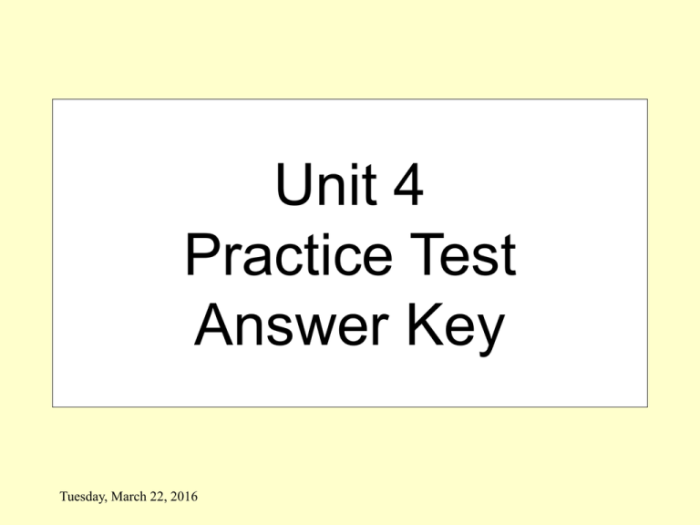The Test Core Mandatory Part 1 Answer Key provides a comprehensive overview of the essential elements, mandatory requirements, answer key structure, assessment criteria, test-taking strategies, and sample questions that are crucial for successful completion of the core part of the test.
This guide is designed to assist individuals in developing a thorough understanding of the test and to equip them with the necessary tools to achieve optimal performance.
Core Components of the Test
The core part of the test is composed of several essential elements that are crucial for evaluating the candidate’s abilities and knowledge. These components work together to provide a comprehensive assessment of the candidate’s skills.
Essential Elements
- Content Knowledge:Assesses the candidate’s understanding of the subject matter, including concepts, theories, and principles.
- Analytical Skills:Evaluates the candidate’s ability to analyze information, draw inferences, and solve problems.
- Communication Skills:Measures the candidate’s ability to express their thoughts and ideas clearly and effectively.
- Critical Thinking Skills:Assesses the candidate’s ability to evaluate arguments, make judgments, and develop original insights.
- Problem-Solving Skills:Evaluates the candidate’s ability to identify, analyze, and resolve problems.
Mandatory Requirements
To successfully complete the core part of the test, candidates must fulfill certain mandatory requirements. These requirements ensure that all candidates are evaluated on a level playing field and that the test results are reliable and valid.
Specific Criteria
- Time Limit:Candidates are given a specific amount of time to complete the test, which varies depending on the subject matter and the number of questions.
- Question Format:The test questions are presented in a variety of formats, including multiple-choice, short answer, and essay questions.
- Answer Requirements:Candidates must provide clear, concise, and well-supported answers to all questions.
- Grading Rubrics:The test is graded using specific rubrics that Artikel the criteria for evaluating responses.
- Passing Score:Candidates must achieve a passing score on the core part of the test to demonstrate their proficiency.
Answer Key Structure

The answer key for the core part of the test is designed to provide clear and accurate guidance to candidates and examiners. It is structured to ensure consistency and ease of use.
Table Artikel
| Question Number | Question Type | Correct Answer | Explanation |
|---|---|---|---|
| 1 | Multiple-Choice | C | Explanation of the correct answer and why other options are incorrect. |
| 2 | Short Answer | Sample answer | Explanation of the requirements for a correct answer. |
| 3 | Essay | Sample answer | Explanation of the requirements for a correct answer, including structure, content, and evidence. |
Assessment Criteria: Test Core Mandatory Part 1 Answer Key

The core part of the test is evaluated using specific assessment criteria that ensure fairness, reliability, and validity. These criteria provide a framework for examiners to assess the quality of candidate responses.
Parameters and Rubrics
- Content Knowledge:Evaluates the accuracy, depth, and organization of the candidate’s knowledge.
- Analytical Skills:Assesses the candidate’s ability to identify and analyze relevant information, draw logical conclusions, and develop original insights.
- Communication Skills:Measures the candidate’s ability to express their thoughts and ideas clearly, concisely, and effectively.
- Critical Thinking Skills:Evaluates the candidate’s ability to evaluate arguments, identify biases, and develop sound judgments.
- Problem-Solving Skills:Assesses the candidate’s ability to identify, analyze, and resolve problems using logical reasoning and creative thinking.
Test-Taking Strategies
Effective test-taking strategies can help candidates maximize their performance on the core part of the test. By understanding the test format, managing time wisely, and employing proven techniques, candidates can improve their chances of success.
Time Management
- Prioritize Questions:Identify the questions that you are most confident in and answer them first.
- Allocate Time Wisely:Divide the allotted time equally among the questions, allowing extra time for more challenging questions.
- Skip Difficult Questions:If you encounter a difficult question, skip it and come back to it later if time permits.
Question Comprehension
- Read Carefully:Read each question carefully and make sure you understand what is being asked.
- Identify s:Pay attention to s that indicate the type of response required, such as “analyze,” “evaluate,” or “compare.”
- Summarize the Question:Restate the question in your own words to ensure comprehension.
Answering Techniques, Test core mandatory part 1 answer key
- Support Your Answers:Provide evidence and examples to support your answers and demonstrate your understanding.
- Organize Your Responses:Structure your answers logically and use clear and concise language.
- Review Your Work:Once you have completed the test, take a few minutes to review your answers and make any necessary corrections.
FAQ
What are the core components of the test?
The core components of the test include the essential elements that make up the foundation of the test, such as the subject matter, question types, and time constraints.
What are the mandatory requirements for successful completion of the core part of the test?
The mandatory requirements for successful completion of the core part of the test are the specific criteria, standards, and expectations that must be met in order to achieve a passing score.
How is the answer key structured?
The answer key is structured in a table format that Artikels the organization, format, and any relevant metadata, providing a clear and concise representation of the correct answers.
What assessment criteria are used to evaluate responses?
The assessment criteria used to evaluate responses include the specific parameters, rubrics, and scoring mechanisms that are employed to determine the accuracy and quality of the answers.
What are some effective test-taking strategies?
Effective test-taking strategies include time management techniques, question comprehension strategies, and answering techniques that are specifically tailored to the core part of the test.